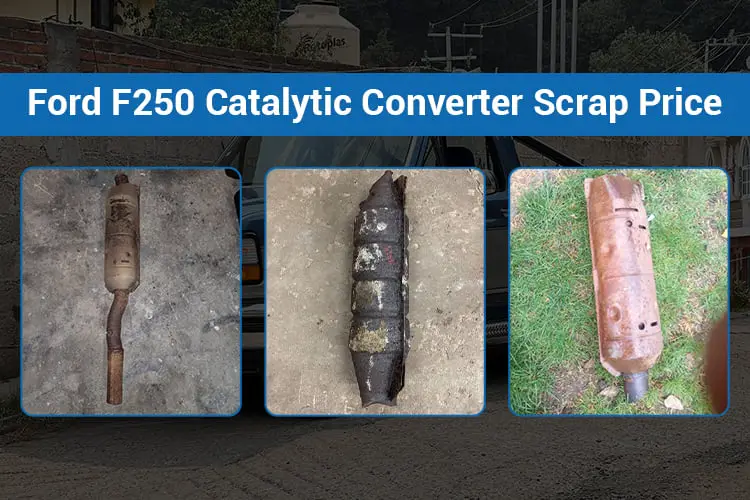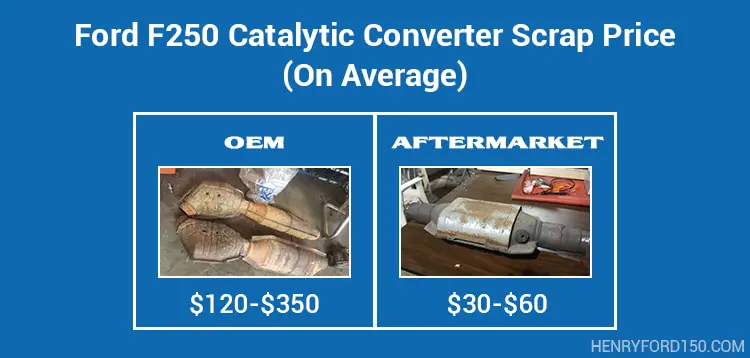The Ford F250 truck has the fourth most expensive catalytic converter on the market, so you will definitely get good money for your irreparable cat if you sell it as scrap. Getting rid of it won’t be a total loss.
However, you need to know more than just the Ford F250 catalytic converter scrap price to get the most favorable deal on your sale and not feel cheated later. Averagely, the cost of an F250 scrap cat is $200. See the price range in the next section.
I stated the F250 scrap cat price and gave some advice on how to get a good deal. You will also read about the signs that indicate the need to turn your converter to scrap.
Let’s dive right in.

How Much Is a Ford F250 Catalytic Converter Worth in Scrap?
In general, the price of a scrap OEM Ford F250 catalytic converter might fall within the range of $120-$350, while that of the aftermarket type is $30-$60.
The prices of OEM scrap cats might be way higher, and they vary based on engine type, as seen in the following examples:
- F250 Ford 6.7 Diesel Catalytic Converter Scrap Price (OEM): Up to $1,850
- F250 Ford 6.4 Diesel Catalytic Converter Scrap Price (OEM): Up to $1,020
F250 cat scrap value is determined by some factors, which have been listed below.
- Physical condition
- Metallic composition
- Cat type (Aftermarket or OEM)
- Recycling capacity
- Item lifespan
- Serial number
- Model year
- Engine size

There are many criteria that a potential scrap cat buyer (recycling company or scrapper) will put into consideration before giving a quote. You will already have an idea of how high or low the pay will be with the type of converter you are selling. The ones from big engines are costlier than the ones from smaller engines. In addition, OEM types are far more expensive than the aftermarket types. Clearly, the price will be higher for the former if it is in good physical condition with minimal rust or damage.
Furthermore, a recent model-year catalytic converter would sell for more, especially if it performs well when tested. It is also most likely to have a good appearance. Old model-year cats would be well-decayed, but that shouldn’t influence their appraisals so much.
The amount of precious metals in the converter is a major factor because those are the most valuable parts to the scrappers and recycling companies. We have rhodium, platinum, and palladium. Other metallic components (which are of far less value) include iron, copper, cerium, nickel, manganese, and stainless steel foil.
Ford F250 Catalytic Converter Scrap Price: Why Is It That High?
Recycling companies can pay hundreds of dollars for your OEM F250 catalytic converter. Find out the reasons such companies would pay that high below.
The high price of scrap cats in the market is largely due to their recycling capacity. I mentioned several precious metals and other metallic components. Those are what recycling companies require for recycling. They make serious money from selling recycled materials to manufacturing industries. Precious metals like rhodium, palladium, and platinum are worth $650, $75, and $35 per gram, respectively.
Also, keep in mind that it isn’t easy or cheap for the recycling companies to extract the metals out of the converters. The process involves the following steps.
Step 1: Gathering a great number of scrap converters
Step 2: Removing their metal covers
Step 3: Heating the honeycomb structure in a specialized furnace to melt off the basic materials
Step 4: Gathering the needed precious metals and sorting them out
Signs You Need to Scrap Your Ford F250 Catalytic Converter
How will you know it is time to turn your cat to scrap? There are signs to look out for, which may mean that the unit is in a critical condition. I have outlined 7 of them below.
Sign #1: Check engine light (CEL) is flashing or on to indicate a malfunctioning cat.
Sign #2: You hear rattling noise that is caused by a broken or damaged honeycomb.
Sign #3: Engine backfiring
Sign #4: Emissions test failure
Sign #5: There are poor accelerations from little or no power as a result of a melted and clogged converter.
Sign #6: A reduction in fuel economy is a sign of a blocked converter. This usually happens when there is bad acceleration.
Sign #7: You smell rotten egg odor, which means that the cat isn’t converting the stinky sulfide into an odorless gas.
Best Tips to Get the Best Ford F250 Catalytic Converter Scrap Price
If you want to gain more in exchange for your Ford catalytic converter, follow these tips before heading to the scrap yard.
Tip #1: Learn about the vehicle’s year, make, and model. Use the serial number on the outer shell of the cat to grab more information.
Tip #2: Check whether you have an original catalytic converter or a replaced one. Actual Ford cats are highly-priced compared to the aftermarket converters. This is because a factory-made Ford cat has metals produced with high standards.
Tip #3: Don’t pull out the honeycomb structure from inside the catalytic converter. The honeycomb has precious metal inside and also allows the scraper to identify the vehicle made for evaluating a quote.
Tip #4: Remove the exhaust pipe at both ends of the catalytic converter shell. This means less work for the yard and more bucks for you!
Tip #5: Browse the websites of companies that are willing to purchase your cat at a higher price. They usually ask for descriptions and details of the unit (e.g., serial number). You may also be asked to attach pictures to your email.
Tip #6: Last but not least, request a quote from as many of such companies as possible, so you can pick the best deal from multiple offers.
Frequently Asked Questions
Q1: Are F250 Diesel Truck Catalytic Converters Worth Anything?
Answer:
Diesel truck catalytic converters don’t usually have that much value because of the absence of precious metals such as rhodium, platinum, and palladium in them. But some of such cats fetch good money if they contain parts of significant value. You could get a diesel catalytic converter for $150-$700.
Q2: Where Is the Catalytic Converter on a Diesel Truck?
Answer:
The Ford F250 catalytic converters on a diesel truck are not the same type of gasoline vehicle. So are their locations. Emissions control on nearly all diesel trucks involves four stages:
- Exhaust Gas Recirculation (EGR): Positioned between the intake manifold and the exhaust manifold
- Diesel Particulate Filtration (DPF): Located in the exhaust system ahead of the exhaust pipe
- Diesel Oxidation Catalyst (DOC): Can be found after the exhaust manifold
- Selective Catalyst Reduction (SCR): Generally situated between the furnace economizer and the air heater
Q3: Where Are the Numbers on a Ford F250 Catalytic Converter?
Answer:
Some Ford cats are designed with “slots and dots” with serial numbers engraved on the slot sections. Other converters have the term “FoMoCo” (Ford Motor Company) on them. You will find the serial below that term.
Q4: What Year Did Ford Start Putting Catalytic Converters on Trucks?
Answer:
Ford started putting catalytic converters on all its vehicles in 1976. This move was primarily aimed at beating the competition in the area of vehicle fuel economy.
My Final Thoughts
By now, you should be convinced that knowing the average Ford F250 catalytic converter scrap price is just a good step among other important ones. The other factors are more crucial to getting a good deal on your sale. You won’t feel cheated after selling your catalytic converter if the tips in this guide are well-followed. But what matters is that you are trading with the best buyer, who would most likely be a recycling company.
Read more: Ford F150 Catalytic Converter Scrap Price: How Much Is It Worth?